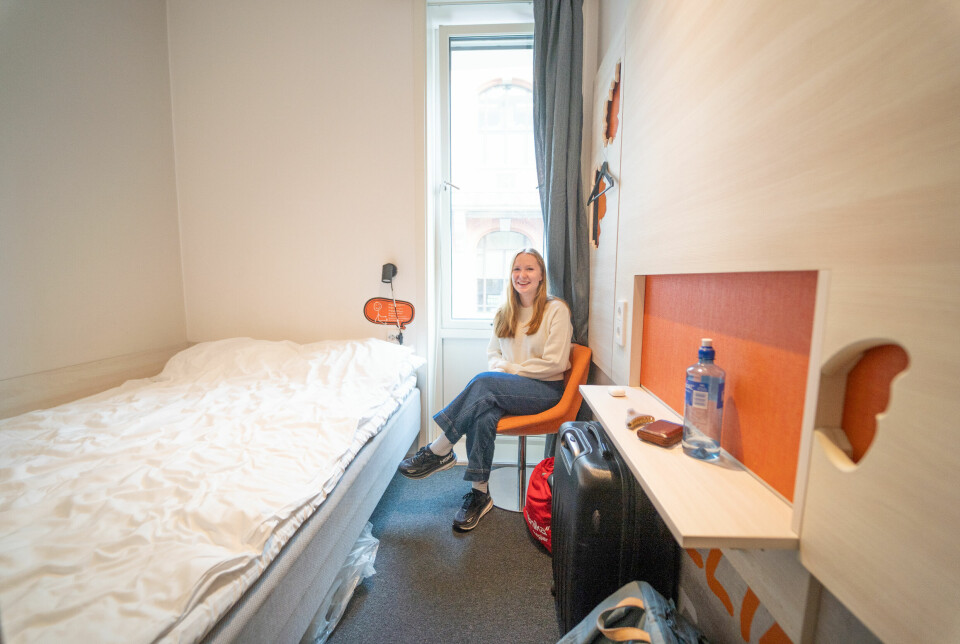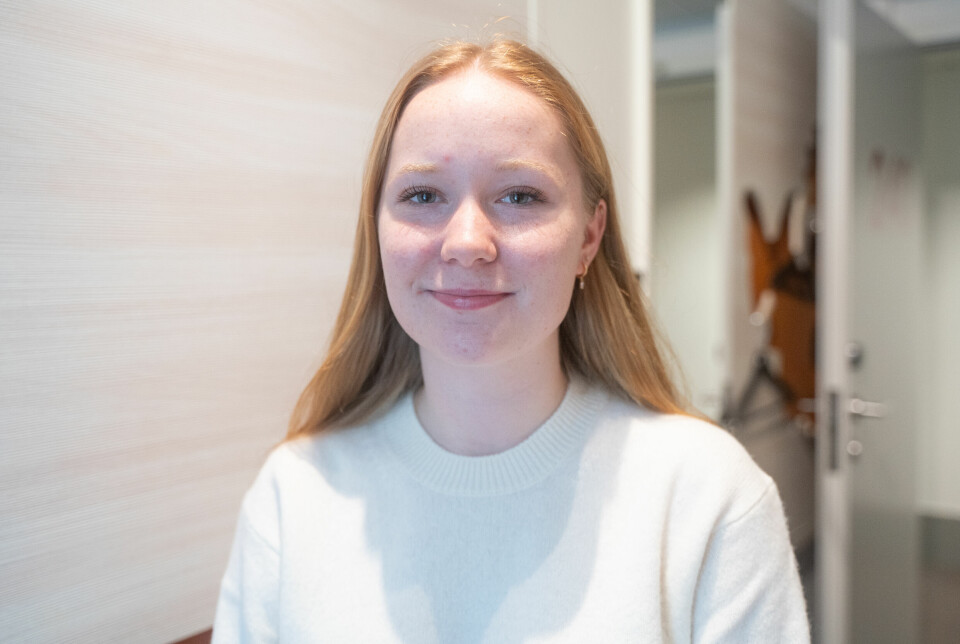#Translation

Several thousand in the queue to get housing
This is a translation of the Norwegian article written by Eirin Balle Tungland, with photographs by Adrian Heggem Misfjord (published in Universitas on August 16, 2023).
While waiting for SiO housing, Marthe has started the academic year in a hotel. SiO offers dormitories and hotel agreements as crisis solutions for over 3,000 students in the housing queue.
First-year student Marthe Wedwik Larssen (21) gets ready for the third day of buddy week from her first place of residence in Oslo: a hotel room. The room at Smarthotel Oslo is 8 meters square in size and costs just over a thousand Norwegian kroner per night.
— I applied for student accommodation already in October last year, says Larssen.
This week she started international studies at the University of Oslo. She had to check into a hotel to be able to take part in the buddy week.
— I would have rather spent this money on something else, but I didn't want to miss out on the social aspect of the buddy week, explains Larssen.
Larssen is not the only one to have stressed over the lack of housing. Recent figures from the Students' Association in Oslo (SiO) show that there are still 3,323 students in the queue for student housing. Nationally, the figure is over 10,000 as of 16 August, according to NTB (The Norwegian News Agency).

Dormitory and hotel
SiO has presented two new offers to help new, homeless students: accommodation in a dormitory for NOK 300 per night, or a discounted hotel room at the Radisson Blu Hotel Oslo Alna for NOK 5,600 a week. This is equivalent to a monthly rent of up to NOK 9,300 for a dormitory and NOK 22,400 for a hotel.
SiO chairman Stine Johannessen writes in an e-mail to Universitas that these offers are not intended to be a permanent solution, but "a solution to the crisis for those who are currently without a roof over their head at the beginning of their studies."
She explains that this offer is something completely different from their ordinary housing offer, and they therefore "did not take into account monthly rent," Johannessen writes.
Head of the Norwegian Student Organization (NSO) Oline Sæther also reacts to SiO's hotel agreement:
— It's a completely wild price to pay to live. In any case, it had ruined my student finances.
Sæther also blames the student grant (studiestøtte - student loans and grants from Lånekassen, translator’s note) that is far below what many students need to have secure access to a safe and affordable place to live.

She refers to NSO's own student housing survey, which shows that 15,000 students are being robbed from a safe and affordable place to live. NSO aims for 20 % of students to be offered student accommodation, but the figure is currently only 15 % nationally, and around 12 % in Oslo.
She says that most students have to turn to the private rental market, where the prices have risen drastically.
— For me, this offer illustrates how critical the situation is, says Sæther.
SiO is concerned about the situation
Johannessen emphasizes that SiO is concerned about the housing situation. "Rental prices in Oslo are historically high, and there are fewer rental properties available," she explains and believes that the reasons for the housing queue are complex.
She points to the availability and price of good plots of land in Oslo, in addition to costs related to the building processes and price increases in the society. She further explains that SiO is "dependent on grants from the authorities to be able to provide more housing at a price the students can pay."
The increased cost frame in the housing market in turn requires increased subsidies for SiO, and the lack of this leads to more expensive rent for the students, claims Johannesen.
Marthe Wedwik Larssen is one of the lucky ones, and on Wednesday she moves out of Smarthotel and into a student dormitory in Kringsjå. Nevertheless, she is critical, since she applied for student housing almost a year ago.
— It should not be necessary to apply almost a year in advance to get housing for the start of studies, she notes.
Housing researcher is in despair
Housing researcher Erling Røed Larsen reacts strongly to SiO's crisis measures. — It's like putting a Band-Aid on a wound where blood is still flowing out. He believes the long queue for student housing is a political scandal.
Røed Larsen is a social economist and the head of the National Center for Housing Market Research at OsloMet. He says that housing researchers have been anticipating the housing crisis for a long time. The solution is to build more, but there is a lack of political will, believes Røed Larsen.
He states that there is not a housing crisis in the whole of Norway, only in Oslo. The city has a deep structural problem – there are simply too few homes, he believes.
— The reason why is that there are a lot of people who want to live in Oslo, says Røed Larsen.
He believes that the desired policy of spreading the population more evenly in the country keeps decision-makers away from building more in Oslo.
— Attempting to politically manage the population's preferences is difficult. It has big consequences, costs a lot, and is only partially successful.
Fear of development
Røed Larsen fears the housing crisis will turn Oslo into a city where only rich middle-aged people can afford to live. He therefore believes that the politicians must change the so-called "apartment norm" which prohibits the construction of new units of less than 35 square metres. This is because the norm goes beyond the supply of apartments that commuters and students can afford.
— The norm is a beautiful thought in the first place, but it does not consider those who live here and now, he says.
Back in the hotel room, student Larssen is getting ready to move to a more permanent residence. Her parents are coming from Hamar with the rest of the moving load that she did not take with her to the hotel.
— I haven't been able to have any kind of control. I understand that I am lucky, but it is sad that everything takes so long. She sympathises with students who are still on the waiting list:
— It's hard to be in a situation where you don't know if you'll get a place to live in.
































